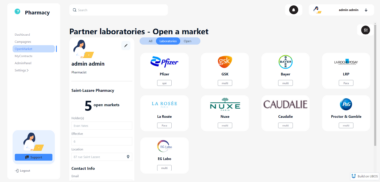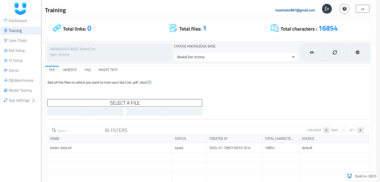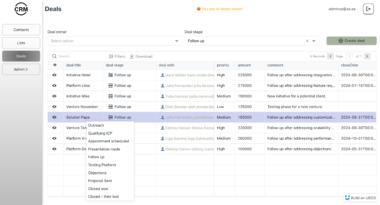UBOS Asset Marketplace: Your Gateway to Seamless MCP Server Integration for AI Agents
In the rapidly evolving landscape of Artificial Intelligence, the ability for Large Language Models (LLMs) to access and interact with real-world data is paramount. The UBOS Asset Marketplace offers a robust solution for this need: the Model Context Protocol (MCP) Server for Open Database Connectivity (ODBC). This powerful tool acts as a bridge, enabling your AI Agents to seamlessly query, analyze, and leverage data residing in various ODBC-accessible databases. By using UBOS platform together with MCP Servers, you can create genAI application, connect your agents with enterprise data and build custom AI Agents with your LLM model.
Understanding the Power of MCP Servers
MCP, or Model Context Protocol, is an open standard that streamlines how applications provide contextual information to LLMs. Think of it as a universal translator, allowing different applications and AI models to communicate effectively. An MCP server acts as an intermediary, granting AI models access to external data sources and tools without needing intricate, custom integrations for each. This fosters modularity, scalability, and efficiency in AI development.
The UBOS Asset Marketplace provides a curated selection of MCP servers, each designed to connect your AI Agents with specific data sources or functionalities. This simplifies the development process, reduces integration complexities, and ultimately accelerates your AI initiatives.
The UBOS MCP Server for ODBC: Connecting LLMs to Your Data
The MCP Server for ODBC within the UBOS Asset Marketplace is specifically designed to provide Large Language Models with transparent access to ODBC-accessible data sources. ODBC (Open Database Connectivity) is a standard API that allows applications to access data in a variety of database management systems (DBMS) using a unified interface. This means that your AI Agents can interact with databases like Virtuoso, MySQL, PostgreSQL, SQL Server, and many others, through a single, consistent protocol.
This particular MCP Server is implemented using TypeScript, leveraging the node-odbc library to route calls to the host system’s local ODBC Driver Manager via Node.js. This architecture ensures performance, stability, and compatibility across different operating systems.
Key Features and Benefits
- Universal Database Connectivity: Access a wide range of databases supporting the ODBC standard, providing your AI Agents with a vast pool of information.
- Seamless Integration: Integrate LLMs with databases without writing custom code for each database type. Focus on building intelligent applications, not managing database connections.
- Enhanced Data Security: Leverage existing ODBC security mechanisms to control data access and protect sensitive information.
- Simplified Development: Streamline your AI development workflow by using pre-built tools and functionalities, saving time and resources.
- Improved AI Accuracy: Provide your LLMs with accurate and up-to-date information, leading to more informed decisions and better overall performance.
- TypeScript Implementation: Benefit from a robust and well-documented codebase, ensuring maintainability and scalability.
- Open Standard Compliance: Adhere to the MCP standard, promoting interoperability and future-proofing your AI applications.
- Ready-to-use Tools: Provides a suite of tools to retrieve database schemas, list tables, describe table structures, filter table names, and execute SQL queries. These tools simplify the interaction between LLMs and ODBC data sources.
- SPASQL and SPARQL Query Support: Extends beyond standard SQL with support for SPASQL (SQL/SPARQL hybrid) and SPARQL queries, which is particularly beneficial for knowledge graphs and semantic web applications, such as those built on Virtuoso.
- AI Assistant Integration: Includes a Virtuoso-specific feature for interacting with LLMs via the Virtuoso Support Assistant/Agent, demonstrating advanced integration capabilities.
Use Cases
The UBOS MCP Server for ODBC unlocks a wide range of use cases across various industries:
- Customer Service: Enable AI Agents to access customer databases and provide personalized support, answer queries, and resolve issues efficiently.
- Financial Analysis: Allow AI models to analyze financial data, identify trends, and make informed investment decisions.
- Healthcare: Enable AI to access patient records (with appropriate security measures), assist in diagnosis, and personalize treatment plans.
- Supply Chain Management: Optimize supply chain operations by allowing AI Agents to access real-time inventory data, predict demand, and manage logistics.
- E-commerce: Enhance product recommendations, personalize marketing campaigns, and detect fraudulent transactions by providing AI models with access to customer and product data.
- Business Intelligence: Connect to various data sources to drive actionable insights by providing tools for querying, filtering, and describing data.
- AI-Powered Chatbots: By leveraging real-time data for more accurate and helpful responses from chatbots for customer support, sales, or other interactive applications.
How It Works
The MCP Server for ODBC acts as a bridge between the LLM and the underlying database. Here’s a simplified overview:
- The LLM sends a request: The LLM, through an MCP client, sends a request to the MCP server, specifying the desired data or action (e.g., executing a SQL query).
- The MCP Server processes the request: The MCP Server receives the request, authenticates the user (if necessary), and translates it into an appropriate ODBC command.
- The ODBC Driver interacts with the database: The ODBC driver communicates with the target database, executes the query, and retrieves the results.
- The MCP Server formats the response: The MCP Server formats the data received from the database into a standardized format (e.g., JSON) that the LLM can easily understand.
- The LLM receives the data: The LLM receives the formatted data and uses it to complete its task (e.g., answer a question, generate a report).
Getting Started with the UBOS MCP Server for ODBC
Integrating the MCP Server for ODBC into your UBOS environment is straightforward:
- Access the UBOS Asset Marketplace: Browse the marketplace and locate the MCP Server for ODBC.
- Install the Server: Follow the installation instructions provided in the documentation. This typically involves cloning the repository, installing dependencies, and configuring environment variables.
- Configure ODBC Connections: Configure your ODBC Data Source Names (DSNs) to point to your target databases. Ensure that the necessary ODBC drivers are installed and configured correctly.
- Integrate with Your AI Agents: Use the MCP client SDK to connect your AI Agents to the MCP Server. Specify the appropriate DSN, username, and password for your database connection.
- Start Querying: Use the provided tools (e.g.,
get_schemas,query_database) to explore your database schema and execute queries.
Detailed Tool Descriptions
The MCP Server offers a comprehensive suite of tools designed to facilitate interaction with databases:
get_schemas: Retrieves a list of all available schemas within the connected database.- Use Case: Discovering the available database schemas for exploration and subsequent table retrieval.
get_tables: Retrieves a list of tables within a specified schema. If no schema is provided, it retrieves tables from the default schema.- Use Case: Identifying the tables available for querying and analysis within a specific schema.
filter_table_names: Filters tables based on a substring pattern in their names.- Use Case: Searching for specific tables based on keywords or patterns in their names.
describe_table: Provides detailed information about the columns of a specific table, including name, data type, size, and nullability.- Use Case: Understanding the structure of a table to formulate effective queries.
query_database: Executes a standard SQL query and returns the results in JSON format.- Use Case: Retrieving data from the database based on custom SQL queries.
query_database_md: Executes a standard SQL query and returns the results formatted as a Markdown table.- Use Case: Presenting query results in a human-readable format, suitable for documentation or reporting.
query_database_jsonl: Executes a standard SQL query and returns the results in JSON Lines (JSONL) format.- Use Case: Processing large datasets in a streaming fashion, where each line is a valid JSON object.
spasql_query: Executes a SPASQL query (a hybrid of SQL and SPARQL), specific to Virtuoso databases.- Use Case: Combining relational data with semantic web data in a single query.
sparql_query: Executes a SPARQL query, used for querying RDF data in Virtuoso databases.- Use Case: Retrieving information from knowledge graphs and semantic web datasets.
virtuoso_support_ai: Leverages Virtuoso’s AI Assistant function, allowing you to interact with LLMs directly through the database.- Use Case: Integrating AI-powered functionalities directly into your database workflows.
Configuration Examples for MCP Applications
To further ease the integration process, the UBOS documentation provides configuration examples for popular MCP applications, including:
- Claude Desktop: A desktop application that allows you to interact with LLMs using natural language. The documentation provides the necessary configuration settings to connect Claude Desktop to the MCP Server for ODBC.
- Cline (Visual Studio Extension): A Visual Studio Code extension that provides a user interface for interacting with LLMs. The documentation details the configuration steps for integrating Cline with the MCP Server.
- Cursor: A code editor with built-in AI capabilities. The documentation explains how to configure Cursor to use the MCP Server for data access.
Optimizing Your AI Agent Development with UBOS
The UBOS platform provides a comprehensive ecosystem for AI Agent development, offering features such as:
- Agent Orchestration: Design and manage complex workflows involving multiple AI Agents.
- Data Integration: Connect your AI Agents with various data sources, including databases, APIs, and cloud services.
- Custom AI Agent Development: Build custom AI Agents using your own LLM models and training data.
- Multi-Agent Systems: Create collaborative AI systems that can solve complex problems together.
By leveraging the UBOS Asset Marketplace and the MCP Server for ODBC, you can significantly accelerate your AI development process, improve the accuracy of your AI models, and unlock new possibilities for AI-powered applications.
Conclusion
The UBOS Asset Marketplace’s MCP Server for ODBC is a crucial asset for any organization looking to harness the power of AI. By providing a seamless and secure connection between LLMs and ODBC-accessible data sources, it enables a new generation of intelligent applications that can drive innovation and transform businesses. Unlock the true potential of your data and your AI Agents with the UBOS platform today.
ODBC Server
Project Details
- OpenLinkSoftware/mcp-odbc-server
- Last Updated: 4/9/2025
Recomended MCP Servers
MCP Server for MySQL databases

Global Notion workspace-accessible MCP server for all Notion pages within the workspace


MCP server to provide Sketch layout information to AI coding agents like Cursor
Model Context Protocol (MCP) Server for Cloudinary API

An MCP for telegram to integrate with Claude desktop.
mcp model-context-protocol mysql cursor n8n
Official mailtrap.io MCP server
 From vibe coding to vibe deployment. UBOS MCP turns ideas into infra with one message.
From vibe coding to vibe deployment. UBOS MCP turns ideas into infra with one message.





